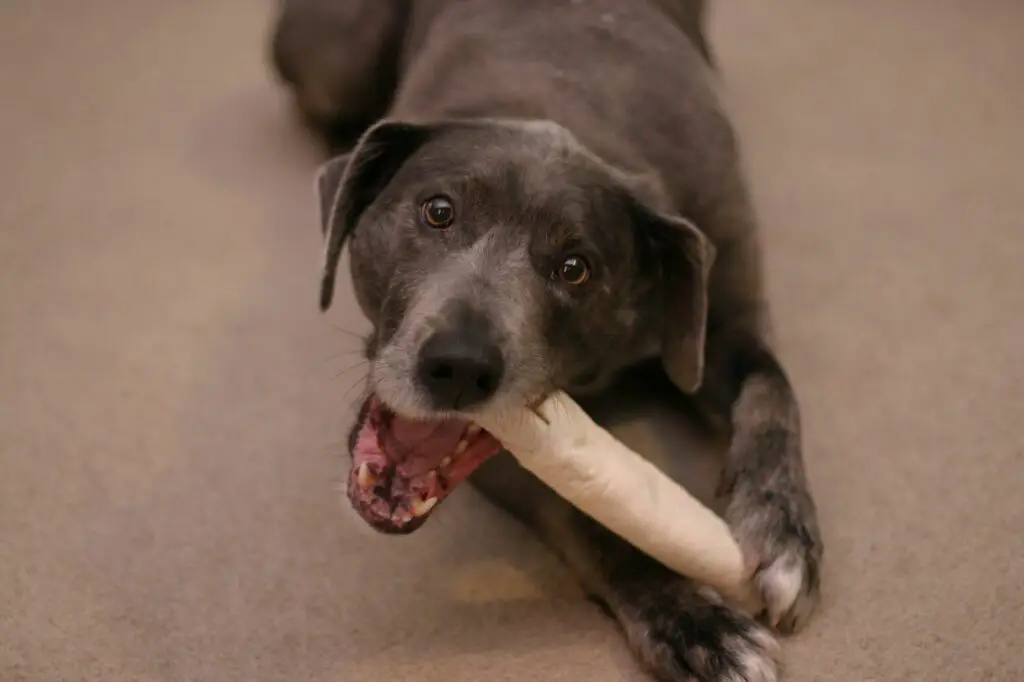Chewing on bones has been a natural behavior of dogs for centuries.
Many pet owners believe that giving their dogs bones to chew on can help clean their teeth and promote oral health. But do bones really clean dogs’ teeth?
Let’s explore this topic further, looking at the benefits and potential risks associated with this age-old practice.
- Do Bones Really Clean Dogs Teeth?
- Will Raw Bones Remove Tartar?
- What Cleans Dogs Teeth Naturally?
- Are Animal Bones Good For Dogs’ Teeth?
- Is Feeding Raw Bones To Dogs Good For Their Teeth?
- What To Look For In Dog Dental Chews?
- FAQs
- Q: What types of bones are best for dogs to clean their teeth?
- Q: Are cooked bones good for dogs’ dental health?
- Q: Are there dental treats or dog chews that can help keep dogs’ teeth clean?
- Q: How do dog bones help in removing plaque and tartar?
- Q: Can smaller dogs also benefit from chewing on bones for dental health?
- Q: Should I give my dog bones every day for dental health?
- Q: Can dog bones break their teeth?
- Q: Are dental bones and dental treats the same thing?
- Q: Can dogs with dental issues still chew on bones?
- In Conclusion
Key Takeaway
- Bones can help clean a dog’s teeth to some extent by scraping away plaque and tartar, but they should be given with caution.
- Raw bones can help remove tartar from a dog’s teeth through the mechanical action of chewing and scraping away plaque.
- Coconut oil and raw bones are natural ways to clean a dog’s teeth.
Do Bones Really Clean Dogs Teeth?

Yes, bones can help clean a dog’s teeth to some extent. The act of chewing helps to scrape away plaque and tartar, which can lead to dental problems if left unchecked.
However, it’s important to note that not all bones are created equal. Raw bones are generally safer for dogs to chew on than cooked ones.
Cooked bones can splinter and cause injury to a dog’s mouth, throat, or digestive system. It’s also important to choose bones that are the appropriate size for your dog to prevent choking hazards.
While bones can contribute to cleaner teeth, they shouldn’t be relied upon as the only method of dental hygiene for your dog.
Regular brushing of your dog’s teeth and professional dental cleanings are also important components of maintaining good oral health.
Will Raw Bones Remove Tartar?

Yes, raw bones can help remove tartar from a dog’s teeth. The mechanical action of chewing on a bone can scrape away plaque, which if left unchecked, hardens into tartar. This helps in maintaining oral hygiene and reducing the risk of dental diseases.
However, it’s important to remember that while raw bones can be beneficial for a dog’s dental health, they should not be the only measure taken to maintain dental hygiene. Regular brushing and professional dental cleanings are also crucial.
Additionally, care should be taken to ensure the bones are safe for your dog. Raw bones are generally safer than cooked ones as they are less likely to splinter.
The size and type of the bone should also be appropriate for your dog’s size and breed to prevent choking or damage to the teeth.
What Cleans Dogs Teeth Naturally?
Several natural methods can help clean a dog’s teeth:
- Chewing Bones: Raw bones can scrape off plaque from a dog’s teeth and stimulate the gums. However, care should be taken to provide appropriately sized bones to prevent choking or tooth damage.
- Coconut Oil: It has antibacterial and antifungal properties that can help clean a dog’s mouth. You can apply coconut oil directly to the dog’s teeth and gums or add it to their food.
- Fruits and Vegetables: Crunchy fruits and vegetables like carrots, apples, or celery can act as natural toothbrushes, helping to scrub away plaque.
- Dental Chews: These are specially designed treats that can help clean a dog’s teeth as they chew on them. Many dental chews are made with natural ingredients that promote oral health.
- Herbs: Certain herbs like parsley, peppermint, and fennel can promote healthy teeth and gums in dogs due to their antiseptic properties.
Remember, while these natural methods can contribute to maintaining a dog’s oral health, they should not replace regular veterinary check-ups and professional dental cleanings.
Are Animal Bones Good For Dogs’ Teeth?
Not all animal bones are suitable for dogs. Cooked bones, for example, are generally not recommended as they can splinter and cause physical harm, such as mouth or throat injuries, or even gastrointestinal issues.
Certain types of bones, like pork bones or rib bones, are more likely to splinter and should generally be avoided.
Even raw bones, while safer, can pose risks if they are too hard, as they can potentially lead to tooth fractures. It’s also important to ensure that the size of the bone is appropriate for your dog to prevent choking hazards.
Is Feeding Raw Bones To Dogs Good For Their Teeth?
Yes, feeding raw bones to dogs can be beneficial for their teeth. Chewing on raw bones can help scrape off plaque, a sticky film that contains bacteria and leads to tartar if not removed.
This can help maintain oral hygiene and reduce the risk of dental diseases.
However, it’s important to note that not all bones are suitable for all dogs. The bone should be appropriately sized for the dog to prevent choking hazards or tooth fractures.
In general, raw bones are safer than cooked ones, as cooked bones can splinter and cause injury.
While raw bones can contribute to cleaner teeth, they should not be the only measure taken for dental hygiene.
Regular brushing and professional dental cleanings are also crucial for maintaining your dog’s oral health.
What To Look For In Dog Dental Chews?
When looking for dog dental chews, there are several factors to consider:
- VOHC Registered Seal: The Veterinary Oral Health Council (VOHC) gives this seal to products that meet their standards for reducing plaque and tartar.
- Cleaning Power: Look for dental chews that effectively remove plaque and tartar. Some dental chews may be textured or have ridges to enhance cleaning power.
- Edibility: Dental chews should be fully digestible to prevent any gastrointestinal issues.
- Flavor: Dogs will be more inclined to chew something that tastes good. Dental chews come in a variety of flavors so you can choose one your dog likes.
- Durability: The chew should be durable enough to withstand your dog’s chewing while still being gentle on their teeth and gums.
- Size: The size of the chew should be appropriate for your dog’s size to prevent choking hazards.
- Ingredients: Look for chews with natural ingredients and avoid those with artificial colors, flavors, or preservatives. Some chews might also have added benefits like vitamins or ingredients for fresh breath.
FAQs
Q: What types of bones are best for dogs to clean their teeth?
A: Raw meaty bones, such as beef bones or marrow bones, are often recommended for dogs to clean their teeth. They provide a natural way for dogs to chew and help maintain their dental health.
Q: Are cooked bones good for dogs’ dental health?
A: No, cooked bones are not recommended for dogs’ dental health. Cooked bones can splinter and cause harm to dogs, potentially leading to digestive issues or injury to the mouth or throat.
Q: Are there dental treats or dog chews that can help keep dogs’ teeth clean?
A: Yes, there are dental treats and dog chews specifically designed to help keep dogs’ teeth clean. These treats often have a dental care formula that promotes oral health and can be a valuable addition to your dog’s dental hygiene routine.
Q: How do dog bones help in removing plaque and tartar?
A: Chewing on bones stimulates the dog’s gums and promotes saliva production, which can help wash away bacteria and food particles. Additionally, the mechanical action of chewing can help scrape off plaque and tartar from the teeth.
Q: Can smaller dogs also benefit from chewing on bones for dental health?
A: Yes, smaller dogs can also benefit from chewing on bones for dental health. It is important to choose bones that are size-appropriate for your dog to ensure safe chewing.
Q: Should I give my dog bones every day for dental health?
A: The frequency of giving your dog bones for dental health depends on various factors, including your dog’s age, breed, and dental condition. It is best to consult with your veterinarian to determine the appropriate amount and frequency of giving bones to your dog.
Q: Can dog bones break their teeth?
A: While it is rare, there is a small risk of dogs breaking their teeth while chewing on bones. It is important to supervise your dog while they are chewing and choose bones that are appropriate in size and hardness for their chewing habits.
Q: Are dental bones and dental treats the same thing?
A: Dental bones and dental treats are similar in their purpose of promoting dental health in dogs. However, they may have different formulations and textures. Some dogs may prefer one over the other, so it may be worthwhile to try different options to see what works best for your dog.
Q: Can dogs with dental issues still chew on bones?
A: Dogs with dental issues should be evaluated by a veterinarian before giving them bones to chew on. Depending on the severity of their dental condition, alternative dental care options may be recommended. It is essential to prioritize your dog’s oral health and follow your veterinarian’s advice.
In Conclusion
In conclusion, while chewing on bones can help scrape away plaque and tartar from a dog’s teeth, it is not a complete solution for oral health.
The hardness of bones can sometimes lead to dental injuries, including broken teeth.
Therefore, it’s crucial for pet owners to consider safer alternatives like dental chews or professional cleanings, alongside providing their dogs with bones under supervision.





Leave a Reply